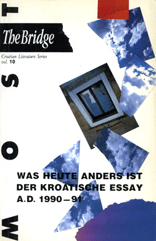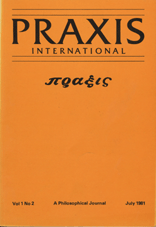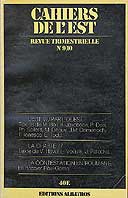
We kindly inform you that, as long as the subject affiliation of our 300.000+ articles is in progress, you might get unsufficient or no results on your third level or second level search. In this case, please broaden your search criteria.









This is the second part of a study with the above title. In the first part the author examines the nature of the compromise accepted by most Hungarian intellectuals after 1956, which he characterizes as a "compromise that rested on overt or covert falsehoods." However, a collection of texts by seventy-six Hungarian authors, covering 1001 typed pages, and dedicated to Istvan Bibo, is a testimonial to the repudiation of such a compromise. This article was received in July, 1981. Istvan Bibo was a prominent Hungarian intellectual; professor of political studies in the University of Szeged and Director of the Social Science Institute which was closed in 1949; Minister of State in the Imre Nagy government; arrested in 1957 and sentenced to life in prison. After being granted amnesty in 1963, he worked in a library and retired in 1971. He published The Third Road (London, 1960) and Paralysis of International Institutions and the Remedies (London, 1976). He was sentenced in 1957 for his Manifesto to the nation and a Draft on a "compromise to resolve the Hungarian question" (both in 1956), and his Recollections (1957).
More...
The military take-over in Poland means the defeat of communist society and its central principle — the control of social life by the political ideology of a party which considers itself the expression of workers. The conflict between the Party and society was apparent during the Stalinist era and the repression of popular and intellectual movements in the last two decades, but the Party was not simply a ruling élite. It claimed to represent the needs of society and the workers' interests. Many insisted on the common hopes of the Party and the mass of Solidarity members. But by the middle of 1981 the gap widens. As Solidarity leaders leave the Party and workers return their Party cards, Solidarity appears as a huge national and social movement, the expression of the Polish population outside the Party. By resorting to military force the Party has lost the foundations of its totalitarian power — it cannot claim to speak for society and history. The Polish situation is contrasted with that of Czechoslovakia and Kadar's Hungary. Increasingly in Poland, as in Rumania, political power plays a repressive role, faced with the growing hostility of the main workers' groups. For a long time popular movements fought an ancien régime on behalf of progress, but Solidarity has clearly shown the new thrust of a popular movement opposed to a productivist modernizing regime, in the name of human rights and freedoms. The military coup signals the defeat of a totalitarian party and a direct confrontation between power and society.
More...
Democracy and Socialism converge and interlink in contemporary Latin American experience — in their development as social movements, in their political allies, and in the obstacles and enemies that they confront. In this analysis I want to deal with the socio-political background of the emergence of a socialist-democratic project. Particular attention is given to the political crisis, the rise and primacy of the Nation-State's power and intervention, and to the appearance in some primary countries of a sui generis Neo-Fascism. In a subsequent analysis, I will explore the role and responsibilities of the Latin American Left, and the origins, content, and possibilities of a socialist-democratic project.
More...
The term avant-garde covers many artistic currents — some oriented to the political left, while others, like Italian Futurism, flirted with fascism. The importance of the Russian avant-garde in the Twenties has led many critics to associate political and artistic avant-gardism. The term is ambiguous and Western historians have emphasized the artistic side, whereas Soviet historians tie avant-garde to a political struggle for a better, more just, more humane world. Are the relations between artistic and political avant-garde mystified and mythified? This essay traces the original meaning of avant-garde and its introduction into aesthetics with Saint-Simonians, the semantic changes and different ideological types, especially in the twenties, as artists and writers, attracted by radical ideals, alternated between fascism and communism. Art movements are inseparable from social changes which affect the ideology of avant-gardes and their formal aspect. In the twenties, the avant-garde shows both a social and political vision and a purely formalistic vision. But the avant-gardes of the fifties, especially the New York School, while questioning American life styles and the fetishism of merchandise, are elitist. There is a hiatus between art and the public. The proletariat does not have intrinsically revolutionary tastes. To prevent art from remaining in an elitist and mercantile ghetto we must bridge the hiatus by developing points of creation and confrontation, and by artistic education.
More...
This essay is a product of the Structural Interpretation of International Inequality Project (S3IP), Institute of International Relations, University of the West Indies, Trinidad, and was presented at the meeting on "The Future of Political Institutions," organized by the World Future Studies Federation and the Gottlieb Duttweilen Institute in Zurich, 17-19 February 1982.
More...
Most studies in the field of work and industrial relations neglect or trivialise the significance of problems of freedom, and relatedly of meaning and identity, for the reproduction of economic organisations. For example, in Goldthorpe et al.'s The Affluent Worker (1968), the responses of employees who reported satisfaction with intrinsically unrewarding work are theorised primarily as a function of privatisation rather than grasped as an expression of resignation or acquiescence to a position of political and economic dependence. The basic limitation with this kind of middle-range theorising is that it moves from the concrete or particular, in the form of employees' responses to researchers' predetermined questions, to the abstract or universal, in the form of instrumentalism as a prevalent orientation to work. So doing, the way in which employees' vocabularies of motive (Mills, 1967) are developed and articulated dynamically in relation to their existential concerns and structural position is all but disregarded. Moreover, in focussing upon workers' expressed orientations, to the neglect of the fashioning of these orientations within specific psycho-social contexts, it leaves unchallenged the conventional wisdom that the interests of 'instrumental' workers are best served by forms of work organisation that offer 'high' wages but provide no real or controlling involvement in the processes of organisational decision-making, design, and development. Hierarchical, non-participatory, non-democratic forms of work organisation are thereby legitimated 'from below' insofar as they are shown to satisfy the material self-interests of employees (Habermas, 1971).
More...
The debate between socialism and feminism that erupted in the 1960s and continues today is the context for the thoughts that follow. The sense one has of that debate is influenced by the organizations in which one engaged in it. Accordingly, my understanding of the debate has been influenced by the socialist organizations in which I engaged in it. Cogent and consistent feminist work by these organizations has been hampered by certain assumptions of the majority in the debate. But of course socialist organizations will have problems with any work they do in a vigorous capitalist society. So the conclusion I am led to is not that socialist organization is irrelevant to feminism but that a reworking of a widely held view of the socialist struggle is in order.
More...



